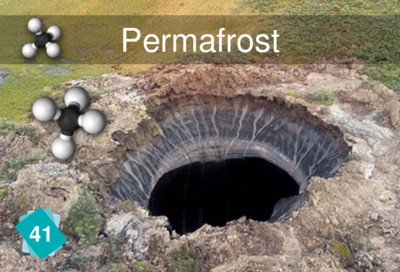En-en adult card 41 permafrost: Difference between revisions
X4resilience (talk | contribs) m (use of lower case 'collage' to refer to the english noun) |
(Collage to Fresk) |
||
| Line 8: | Line 8: | ||
Permafrost is soil that is permanently frozen for at least two consecutive years<ref>[https://www.ipcc.ch/site/assets/uploads/2018/03/WG1AR5_SummaryVolume_FINAL_FRENCH.pdf#page=212 Glossary, Report 5, Working Group 1 (French)]</ref>. | Permafrost is soil that is permanently frozen for at least two consecutive years<ref>[https://www.ipcc.ch/site/assets/uploads/2018/03/WG1AR5_SummaryVolume_FINAL_FRENCH.pdf#page=212 Glossary, Report 5, Working Group 1 (French)]</ref>. | ||
The two last cards to be added to the | The two last cards to be added to the Fresk after card 40 are potentially violent [[wikipedia:Climate_change_feedback|feedback]] loops or "climate bombs" which, if triggered, would cause us to lose control over the climate for good. | ||
Thermokarst are veritable bioreactors at the heart of the process of releasing frozen carbon: when the permafrost thaws, pieces of soil detach and fall into the water, bringing nutrients and carbon to the bacteria and plankton present in the sea, which degrade them into CO<sub>2</sub> (in the water layers near the surface) and methane (CH<sub>4</sub> -- in the oxygen-deprived bottom)<ref>[https://lejournal.cnrs.fr/articles/pergelisol-le-piege-climatique CNRS The newspaper Permafrost, the climate trap (French)]</ref>. | Thermokarst are veritable bioreactors at the heart of the process of releasing frozen carbon: when the permafrost thaws, pieces of soil detach and fall into the water, bringing nutrients and carbon to the bacteria and plankton present in the sea, which degrade them into CO<sub>2</sub> (in the water layers near the surface) and methane (CH<sub>4</sub> -- in the oxygen-deprived bottom)<ref>[https://lejournal.cnrs.fr/articles/pergelisol-le-piege-climatique CNRS The newspaper Permafrost, the climate trap (French)]</ref>. | ||
Revision as of 08:06, 24 July 2021
Card #41: Permafrost
| Causes | Consequences | |

|
Permafrost is permanently frozen ground.
Permafrost thawing leads to the decomposition of organic matter previously frozen underground, a phenomenon that releases methane and CO2 into the atmosphere.
Beyond +2°C, it is almost certain this phenomenon will accelerate and make the climate spiral out of control.
Explanation
Permafrost is soil that is permanently frozen for at least two consecutive years[1].
The two last cards to be added to the Fresk after card 40 are potentially violent feedback loops or "climate bombs" which, if triggered, would cause us to lose control over the climate for good.
Thermokarst are veritable bioreactors at the heart of the process of releasing frozen carbon: when the permafrost thaws, pieces of soil detach and fall into the water, bringing nutrients and carbon to the bacteria and plankton present in the sea, which degrade them into CO2 (in the water layers near the surface) and methane (CH4 -- in the oxygen-deprived bottom)[2].
Correction
Causes
Consequences
Other possible links
Other causes
- Energy budget If we take the idea of energy conservation all the way, we can link the thawing of permafrost and methane hydrates back to the energy budget.
Other consequences
- Additional greenhouse effect The permafrost card can be linked either to Other GHGs or to Additional Greenhouse Effect. The Other GHGs card is about GHGs emitted by human activities, while the methane in permafrost is not of human origin.
- Vectors of disease Permafrost contains billions of buried bacteria and viruses. If it melts, diseases might contaminate humans and animals. In 2016, there was an outbreak of anthrax caused by a melted reindeer carcass.
To go further
For online murals, you can show this video from the University of Alaska Fairbanks showing the flammable methane stored in the permafrost.
Climate Action Network France: Thawing permafrost carbon will increase global warming, 2018 (French)
RT France documentary: The mystery of permafrost (French)